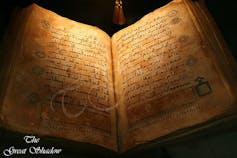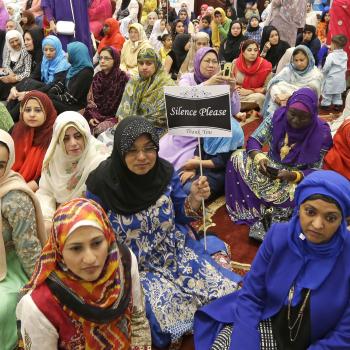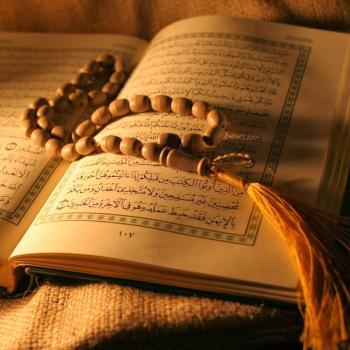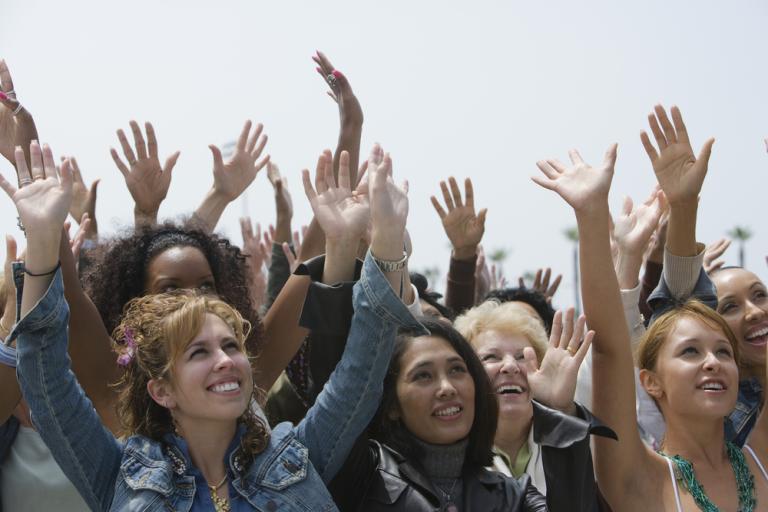
Gage Skidmore, CC BY-SA
By Denise A. Spellberg, University of Texas at Austin
The new Congress includes its first two Muslim women members. One of them, Rashida Tlaib of Michigan, considered getting sworn in privately using a copy of the Qur’an from the library of one of America’s Founding Fathers.
She told CNN this shows “Islam has been part of American history for a long time.” I explored this little-known history in my book “Thomas Jefferson’s Qur’an: Islam and the Founders”.
Islam, an American religion
Muslims arrived in North America as early as the 17th century, eventually composing 15 to 30 percent of the enslaved West African population of British America. (Muslims from the Middle East did not begin to immigrate here as free citizens until the late 19th century.) Even key American Founding Fathers demonstrated a marked interest in the faith and its practitioners, most notably Thomas Jefferson.
As a 22-year-old law student in Williamsburg, Virginia, Jefferson bought a Qur’an – 11 years before drafting the Declaration of Independence.
The purchase is symbolic of a longer historical connection between American and Islamic worlds, and a more inclusive view of the nation’s early, robust view of religious pluralism.

SSk Graphy, CC BY
Although Jefferson did not leave any notes on his immediate reaction to the Qur’an, he did criticize Islam as “stifling free enquiry” in his early political debates in Virginia, a charge he also leveled against Catholicism. He thought both religions fused religion and the state at a time he wished to separate them in his commonwealth.
Despite his criticism of Islam, Jefferson supported the rights of its adherents. Evidence exists that Jefferson had been thinking privately about Muslim inclusion in his new country since 1776. A few months after penning the Declaration of Independence, he returned to Virginia to draft legislation about religion for his native state, writing in his private notes a paraphrase of the English philosopher John Locke’s 1689 “Letter on Toleration”:
“[he] says neither Pagan nor Mahometan [Muslim] nor Jew ought to be excluded from the civil rights of the commonwealth because of his religion.”
The precedents Jefferson copied from Locke echo strongly in his Virginia Statute for Religious Freedom, which proclaims:
“(O)ur civil rights have no dependence on our religious opinions.”
The statute, drafted in 1777, which became law in 1786, inspired the Constitution’s “no religious test” clause and the First Amendment.
Jefferson’s pluralistic vision
Was Jefferson thinking about Muslims when he drafted his famed Virginia legislation?
Indeed, we find evidence for this in the Founding Father’s 1821 autobiography, where he happily recorded that a final attempt to add the words “Jesus Christ” to the preamble of his legislation failed. And this failure led Jefferson to affirm that he had intended the application of the Statute to be “universal.”
By this he meant that religious liberty and political equality would not be exclusively Christian. For Jefferson asserted in his autobiography that his original legislative intent had been “to comprehend, within the mantle of its protection, the Jew and the Gentile, the Christian and Mahometan [Muslim], the Hindoo, and Infidel of every denomination.”
By defining Muslims as future citizens in the 18th century, in conjunction with a resident Jewish minority, Jefferson expanded his “universal” legislative scope to include every one of every faith.
Ideas about the nation’s religiously plural character were tested also in Jefferson’s presidential foreign policy with the Islamic powers of North Africa. President Jefferson welcomed the first Muslim ambassador, who hailed from Tunis, to the White House in 1805. Because it was Ramadan, the president moved the state dinner from 3:30 p.m. to be “precisely at sunset,” a recognition of the Tunisian ambassador’s religious beliefs, if not quite America’s first official celebration of Ramadan.
Muslims once again provide a litmus test for the civil rights of all U.S. believers. Today, Muslims are fellow citizens and members of Congress, and their legal rights represent an American founding ideal still besieged by fear mongering, precedents at odds with the best of our ideals of universal religious freedom.![]()
Denise A. Spellberg, Professor of History and Middle Eastern Studies, University of Texas at Austin
This article is republished from The Conversation under a Creative Commons license. Read the original article.













